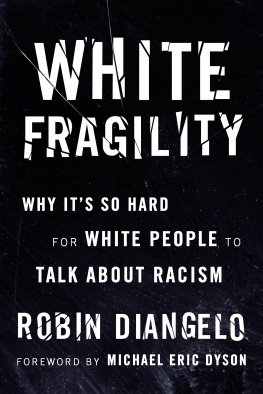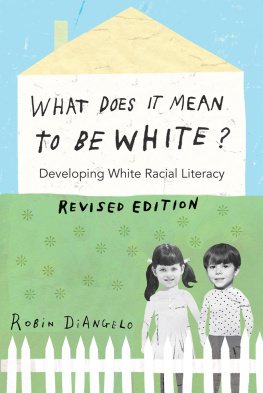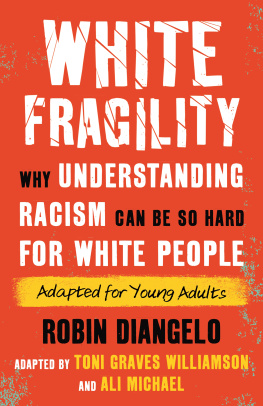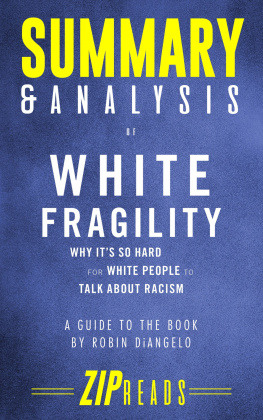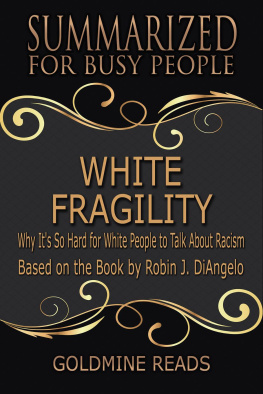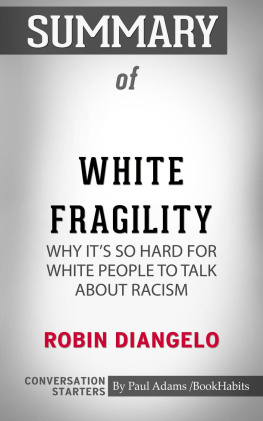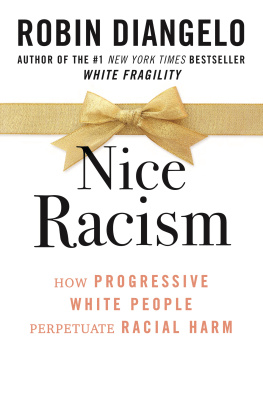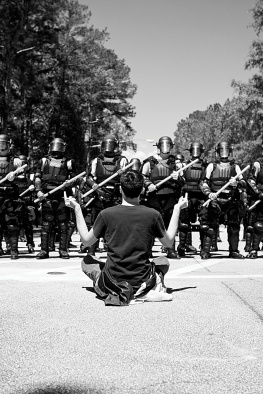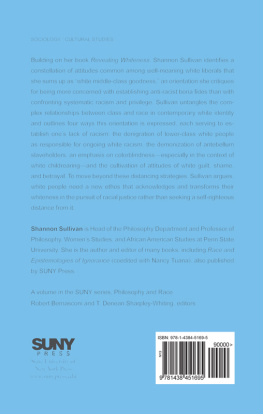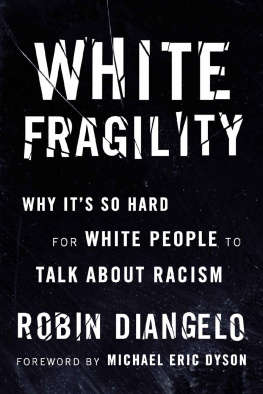Table of Contents
Pagebreaks of the print version
Guide
PRAISE FOR WHITE FRAGILITY
White Fragility is a rare and incisive examination of the system of white-body supremacy, which binds us all as Americans. Robin DiAngelo explicates the underlying Western ideologies of individualism and presumed objectivity that tighten those bonds. But she doesnt just analyze this system. With authenticity and clarity, she provides the antidote to white fragility and a road map for developing white racial stamina and humility. White Fragility loosens the bonds of white supremacy and binds us back together as human beings.
RESMAA MENAKEM ,
author of My Grandmothers Hands and Rock the Boat
What an amazingly powerful book Robin DiAngelo has written! This remarkable book encourages folks to embrace a more deeply nuanced exploration of white culture and dominance and, as such, will be a great contribution in promoting the necessary policy change and healing that this country requires. Dr. DiAngelos work in deconstructing whiteness is not only brilliant, it is written in a way that is crystal clear and accessible to each and every reader. While this is a powerful scholarly analysis of white fragility, it is also an invitation to engage in deep personal inquiry and collective change. As a woman of color, I find hope in this book because of its potential to disrupt the patterns and relationships that have emerged out of long-standing colonial principles and beliefs. White Fragility is an essential tool toward authentic dialogue and action. May it be so!
SHAKTI BUTLER ,
president of World Trust and director of Mirrors of Privilege: Making Whiteness Visible
As powerful forces of white racism again swell, DiAngelo invites white progressives to have a courageous conversation about their culture of complicity. To eradicate racism, she encourages white people to relinquish ingrained hyper-attachment to individualism and embrace predictable patterns of their own racial group. White Fragility provides important antiracist understanding and essential strategies for well-intentioned white people who truly endeavor to be a part of the solution.
GLENN E. SINGLETON ,
author of Courageous Conversations About Race
White fragility is the secret ingredient that makes racial conversations so difficult and achieving racial equity even harder. But by exposing it and showing us allincluding white folkshow it operates and how it hurts us, individually and collectively, Robin DiAngelo has performed an invaluable service. An indispensable volume for understanding one of the most important (and yet rarely appreciated) barriers to achieving racial justice.
TIM WISE ,
author of White Like Me: Reflections on Race from a Privileged Son
In White Fragility, Robin DiAngelo demonstrates an all-too-rare ability to enter the racial conversation with complexity, nuance, and deep respect. Her writing establishes her mastery in accessing the imaginal, metaphoric mind, where the possibility for transformation resides. With an unwavering conviction that change is possible, her message is clear: the incentive for white engagement in racial justice work is ultimately self-liberation.
LETICIA NIETO ,
coauthor of Beyond Inclusion, Beyond Empowerment: A Developmental Strategy to Liberate Everyone

These ceremonials in honor of white supremacy,
performed from babyhood, slip from the
conscious mind down deep into muscles...
and become difficult to tear out.
LILLIAN SMITH , Killers of the Dream (1949)
FOREWORD
Keyser Sze, Beyonc,
and the Witness Protection Program
MICHAEL ERIC DYSON
One metaphor for race, and racism, wont do. They are, after all, exceedingly complicated forces. No, we need many metaphors, working in concert, even if in different areas of the culture through a clever division of linguistic labor. Race is a condition. A disease. A card. A plague. Original sin. For much of American history, race has been black cultures issue; racism, a black persons burden. Or substitute any person of color for black and youve got the same problem. Whiteness, however, has remained constant. In the equation of race, another metaphor for race beckons; whiteness is the unchanging variable. Or, to shift metaphors, whiteness has been, to pinch Amiri Barakas resonant phrase, the changing same, a highly adaptable and fluid force that stays on top no matter where it lands. In a sense, whiteness is at once the means of dominance, the end to which dominance points, and the point of dominance, too, which, in its purest form, in its greatest fantasy, never ends.
To be sure, like the rest of race, whiteness is a fiction, what in the jargon of the academy is termed a social construct, an agreed-on myth that has empirical grit because of its effect, not its essence. But whiteness goes even one better: it is a category of identity that is most useful when its very existence is denied. Thats its twisted genius. Whiteness embodies Charles Baudelaires admonition that the loveliest trick of the Devil is to persuade you that he does not exist. Or, as an alter ego of the character Keyser Sze says in the film The Usual Suspects, The greatest trick the devil ever played was to convince the world that he didnt exist. The Devil. Racism. Another metaphor. Same difference.
Robin DiAngelo is here to announce, in the words of evangelicalsand rappers Rick Ross and Jay-ZThe Devil Is a Lie. Whiteness, like race, may not be trueits not a biologically heritable characteristic that has roots in physiological structures or in genes or chromosomes. But it is real, in the sense that societies and rights and goods and resources and privileges have been built on its foundation. DiAngelo brilliantly names a whiteness that doesnt want to be named, disrobes a whiteness that dresses in camouflage as humanity, unmasks a whiteness costumed as American, and fetches to center stage a whiteness that would rather hide in visible invisibility.
It is not enough to be a rhetorician and a semiotician to deconstruct and demythologize whiteness. One must be a magician of the political and the social, an alchemist of the spiritual and psychological too. One must wave off racist stereotypes and conjure a rich history of combatting white supremacy and white privilege and white liesa history that has often been buried deep in the dark, rich, black American soil. DiAngelo knows that what she is saying to white folk in this book is what so many black folks have thought and believed and said over the years but couldnt be heard because white ears were too sensitive, white souls too fragile.
DiAngelo joins the front ranks of white antiracist thinkers with a stirring call to conscience and, most important, consciousness in her white brothers and sisters. White fragility is a truly generative idea; it is a crucial concept that inspires us to think more deeply about how white folk understand their whiteness and react defensively to being called to account for how that whiteness has gone under the radar of race for far too long. DiAngelo is wise and withering in her relentless assault on what Langston Hughes termed the ways of white folks. But she is clear-eyed and unsentimental in untangling the intertwined threads of social destiny and political prescription that bind white identity to moral neutrality and cultural universality.

